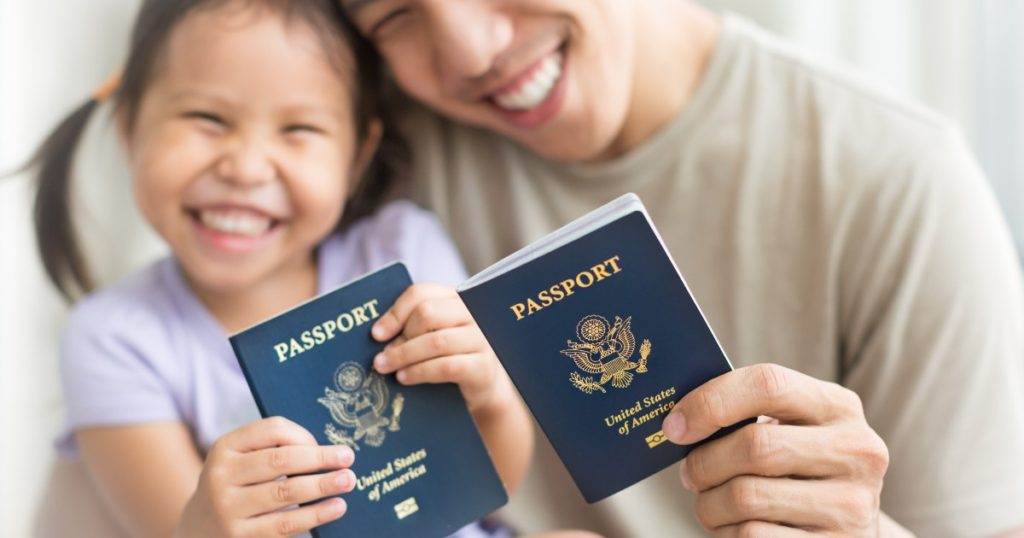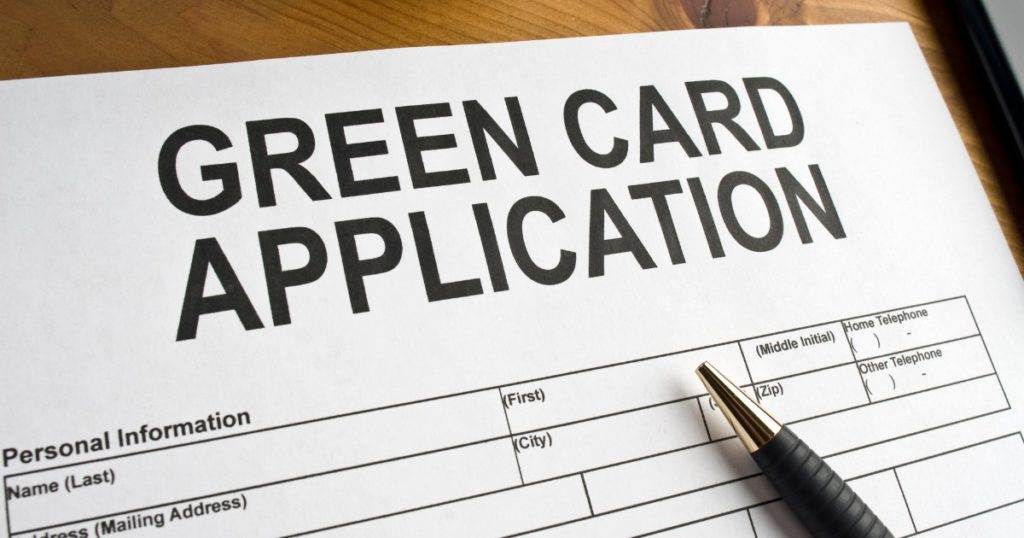As a U.S. citizen or lawful permanent resident, you can sponsor your immediate family members in applying for an immigrant visa or green card. One of the most common ways to do this is to apply for a family-based green card for parents. A family-based green card allows a foreign parent of a U.S. citizen or permanent resident to enter and remain in the country as a permanent resident.
This blog post will discuss the requirements, benefits, and process for parents applying for a family-based green card.
Eligibility for a family-based green card
To obtain a family-based green card, your parents must prove they are related to you and meet the requirements. The requirements include age, work experience, and lack of a criminal record. Also, as a U.S. citizen, you must be at least 21 to apply on your parents’ behalf.

Benefits of a family-based green card
Here are the ten benefits of a family-based green card:
Legal Permanent Residency: With a family-based green card, you can obtain legal permanent residency in the United States, meaning you can live and work there indefinitely.
Eligibility for government benefits: As a permanent resident, you are eligible for several government benefits, including Social Security, Medicare, and other public assistance programs.
Work Eligibility: With a green card, you can legally work in the United States without being tied to a specific employer or job.
Travel: As a green card holder, you can travel outside the United States and return without a visa. You can also travel within the country without restrictions.
Petition for family members: once you have your green card, you can petition to have your spouse and unmarried children under 21 join you in the United States.
Eligibility for citizenship: After being granted permanent residency for three to five years, you can apply for citizenship, giving you the right to vote.
Protection from deportation: Obtaining a green card protects you from deportation if you comply with the law.
Better Job Opportunities: Possessing a green card can increase your chances for better job opportunities and higher salaries.
Education: As a green card holder, you are eligible for in-state tuition rates at most colleges and universities, which can reduce the cost of higher education.
Investment Opportunities: As a green card holder, you can invest in the United States, start a business, and participate in the U.S. economy.
Procedure for obtaining a family-based green card
The process for obtaining a family-based green card for parents involves several steps. First, you must petition the United States Citizenship and Immigration Services (USCIS) to establish your family relationship. Once the Petition is approved, the foreign national must apply for an immigrant visa through the National Visa Center. They must also undergo a medical examination and attend an interview at a U.S. consulate or embassy in their home country. If the application is approved, they may enter the United States as permanent residents.
It is important to note that the process can take several to many years, depending on the individual case and country of origin. It is recommended that an immigration attorney be consulted to ensure that all required documents are submitted correctly and promptly.
Obtaining a family-based green card for parents can be a complex process, but it has significant benefits for parents and their children. It allows families to reunite and live together permanently in the United States.

Immediate relative
A parent or spouse is classified as an immediate relative, simplifying obtaining a green card. This means there is no limit or cap on the number of visas available to immediate relatives of U.S. citizens, and the waiting period is much shorter compared to other family preference categories.
Financial Support
As a sponsor, you must prove that you meet the financial requirements to sponsor your parents. To do so, you must file Form I-864 (Affidavit of Support) with U.S. Citizenship and Immigration Services (USCIS) or I-134 (Declaration of Financial Support) with the Department of State.
Medical Examination
Your relative must undergo a medical examination to meet U.S. health standards.
Admissibility
Your relative must also be admitted or admissible to the United States. This means they must not have a disqualifying criminal record or have violated U.S. immigration laws.
Wait for the priority date
Once you have filed Form I-130, you will receive notification from the National Visa Center (NVC) of the date your relative’s green card application was received, known as the priority date. The length of the wait depends on how many people in the same category with the same priority date are ahead of your parents and what country they are nationals of.
Consular processing or status adjustment
Once your relative’s priority date is valid, they will have to undergo either consular processing or adjustment of status, depending on whether or not they are currently in the United States.
Participation in a Green Card Interview
Your relative will be required to participate in a green card interview. They will be required to answer questions about their relationship to you and whether they are admissible to the United States and provide any additional documentation requested by USCIS.
Key factors related to Family-Based Green Card for Parents
Immigrant Visa
An immigrant visa is a document that allows foreign nationals to enter and remain in the country for a specified period. It shows that the visa holder has met specific criteria for entry into the United States.
Embassy and Consulate
An embassy is the permanent diplomatic mission of a foreign country where diplomatic business is conducted. A consulate is an official office of a foreign country in a region that deals with matters related to visas, passports, and similar documents.
Passport and Paperwork
A passport is a travel document that identifies the holder and allows them to travel internationally. Paperwork for immigration applications may include documents such as birth certificates, marriage and divorce certificates, and criminal records.
Home Country
A foreign national’s home country is the country from which they originate or whose citizenship they hold permanently.
Visa Application
A visa application is a legal document submitted by a U.S. citizen or permanent resident requesting permission to bring certain family members to the United States for an extended period.
Permanent Residence
Permanent residency allows foreign nationals to live, work, and pay taxes in the United States permanently.
Immigration Law
Immigration law refers to the policies, laws, and regulations that govern immigration and naturalization processes in the United States.
Consultation
A consultation is a meeting with a qualified immigration attorney who can help applicants understand their rights and options under U.S. immigration law.
Processing Time
Processing time refers to the time it takes to process an immigration application or Petition.
Visa Bulletin
The Visa Bulletin is a monthly publication that provides information on immigrant visa availability based on the applicant’s country of origin and priority date.
Medical Examination
A medical examination is a mandatory part of the immigration process to ensure that the applicant does not have a contagious disease. COVID vaccinations are required to pass the immigration medical.
Adjust Status
Adjustment of status refers to the process of changing immigration status while in the United States.
Waiting Period
The waiting period refers to the time applicants must wait to obtain various petitions or approvals after submitting their applications to USCIS.
Filing Fee
Filing fees refer to the fees applicants pay to process their visa and green card applications when they submit their applications to USCIS.
Further information on the green card procedure for family members

Green Card Categories: There are two main categories of green cards, employment-based and family-based.
Green Card Application Procedure: applying for a family-based green card usually requires submitting several forms and documents and paying fees.
Marital Green Card Application Procedure: obtaining a family-based green card through marriage to a U.S. citizen or lawful permanent resident.
U.S. green card holders: permanent residents of the United States who have obtained a green
card and are authorized to live and work in the United States.
Family-Based Immigration: sponsoring eligible relatives for a green card based on family ties.
Immigration Plans: the steps and procedures to achieve a specific immigration goal.
Immigration Purposes: The reason a person is seeking a green card or nonimmigrant visa.
Prior Immigration Violations: The impact of past immigration law violations on current and future green card or visa applications.
Tourist Visa: A nonimmigrant visa category that allows individuals to travel to the United States for tourist, recreational, or medical purposes.
Visa Category: The classification of legal status for nonimmigrant and immigrant visas.
Requirements and documents for the green card process for family members
Form of Relief: The legal remedies available to individuals seeking a family-based green card.
Pending Form I-485: The status of an application to adjust status currently under immigration review.
Form I-130 Petition: the document U.S. citizens and permanent residents use to sponsor eligible family members for a green card.
Form I-130A: The companion document for foreign national spouses that is required to supplement Form I-130.
Form I-765: The application for work authorization for family members applying for a green card.
Form I-797C: The notice that USCIS issues after filing an application for a family member’s green card.
Police Certificate of Good Conduct: a document that certifies that an individual has no criminal record or has not been involved in criminal activity in a particular jurisdiction.
Frequently asked questions about family-based green cards for parents:
What is a family-based green card for parents?
A family-based green card allows U.S. citizens or permanent residents to sponsor their parents for permanent residence in the United States.
Who is eligible to sponsor a parent for a family-based green card?
Only U.S. citizens at least 21 may sponsor their parents for a family-based green card.
What is the green card interview process for parents?
During the green card interview, parents will be asked questions about their relationship with their sponsor, admissibility in the United States, and medical history. They may also be required to provide additional documentation.
How long does obtaining a family-based green card for parents usually take?
The processing time for a family-based green card can vary, but it generally takes about 12 to 30 months from filing the Form I-130 application until the green card is approved.
How much does it cost to apply for a family-based green card?
The fee to apply for a family-based green card for parents is $1,760 as of April 2023 but will soon be raised to over $2,800. Additional costs may include attorney fees, medical exam fees, and travel expenses.
What other family members can you sponsor for Immigration?
In addition to parents, U.S. citizens and permanent residents can sponsor their spouses, children and siblings.
What is a priority date, and why is it important?
A priority date is a date the USCIS received Form I-130. The priority date determines how long it will take USCIS to process the immigration petition. Immediate relatives like the spouse or parent of a U.S. citizen are qualified to apply for a green card without waiting for a priority date.
How long does it usually take to obtain a priority date?
The time it takes to obtain a priority date can vary, but it can be anywhere from two to over 20 years.
Do my parents have to pass a medical exam to receive a family-based green card?
Yes, all immigrants (including parents) must pass a medical examination to ensure they do not have a contagious disease that could pose a public health threat. COVID vaccinations are required for all immigrants by the U.S. government.
What are the financial requirements for parents applying for a green card for family members?
Sponsors must demonstrate that their income meets a minimum threshold to support themselves and their parents. They will be required to submit an affidavit of support to USCIS and extensive documentation of their compensation.
Applying for a family-based green card for relatives can be complicated and lengthy, requiring much documentation and preparation. To avoid delays or mistakes, have an experienced immigration attorney guide you. If you want to learn more about green cards for families or need help with the application process, please get in touch with Susan Pai at (904) 268-7812 or by email at Susan.Pai@rm-law.com.


